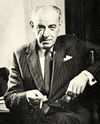The Antagonists (Haggard novel)
 From Citizendium - Reading time: 4 min
From Citizendium - Reading time: 4 min

William Haggard on the back cover of The Conspirators, 1967
The Antagonists is a 1964 suspense novel by the British author William Haggard published in England by Cassell and in the United States by Ives Washburn. It was Haggard's sixth of 21 books involving his protagonist Colonel Charles Russell, the urbane head of the unobtrusive but lethal Security Executive, a government counterintelligence agency clearly based on the actual MI5 or Security Service, where he moves easily and gracefully along C.P. Snow's Corridors of Power in Whitehall. Like Haggard's earlier books it has standard elements of suspense thrillers along with detailed examinations of character, but in this case with more scenes of direct action and somewhat less dissection of character and motivation than in the first three books.
Plot[edit]
Protagonist is perhaps too strong a word to describe Colonel Russell. As Haggard himself wrote about his fiction:
My novels are chiefly novels of suspense with a background of international politics. A Colonel Charles Russell of the Security Executive, a not entirely imaginary British counter-espionage organization, while not a protagonist in the technical sense, holds the story line together in the background by his operations, while the characters in the foreground carry the action."[1]
As usual with Haggard's books, there are subplots within subplots, but the main theme is a simple one: one of the world's most brilliant scientists, Alexander Gorgan, has been ordered by the President of his native country (unnamed but clearly Yugoslavia) to deliver an address to an eminent group of scientists in London. He is the world's greatest expert in microwaves, which have become vital in the development of anti-ballistic missile defenses. It is a political decision: there are mounting tensions within his country between different groups of Communists, and the Soviets (also unnamed, but clearly identified) are trying to interfere in an unhelpful way. Gorgan is a prize that any of the factions would like to seize (or simply kill), so England, which enjoys friendly relations with Gorgan's President, is seen as being a sanctuary for weeks or even months. And Gorgan's masters have confidence that the Special Branch and Colonel Russell's Security Executive together will be able to secure his safety. Gorgan, however, although a relatively young, hard-living bon vivante, also has a serious neurological issue and he collapses immediately upon arrival in England and is rushed to a private hospital in the countryside where he will spend weeks in fitful recuperation. Seizing this unexpected opportunity, one of the factions immediately makes an attempt on his life but is thwarted by the Security Executive. And now another unforeseen faction appears: Americans, who are nominal allies of the English. Rather than wanting to kill him, at least one of them, an Embassy diplomat and multi-millionaire, merely wants to brainwash him and drain him of his knowledge of microwaves. But Colonel Russell, now aided by the timely reappearance of his "invaluable" aide Major Mortimer from earlier books, enlists the help of James Scobell,[2] an American semi-colleague who clearly works for the unnamed CIA, and with Mortimer and Scobell consulting closely, he arranges an elaborate rescue of Gorgan from a kidnapping contrived to deliver him clandestinely to Russia. At the very end of the book Russell and his ministerial master from earlier books, Gabriel Palliser, are discussing what to do with Gorgan, now arranged by the Yugoslavs to be in England for a long period of time. Sir William Banner, the prominent industrialist from the previous High Wire, is proposed as being a possible patron. Russell agrees but says firmly: "We mustn't cheat." And the Minister replies: "We mustn't be caught out cheating."
Reception and/or Appraisal[edit]
Reviews were very favorable:
The New York Times wrote: There is no suspense author whom I read more slowly than I do William Haggard. I hate to miss the least nuance of his intricate constructions of plots and ploys and power‐plays, as delicate, and as deadly as a spider's web. In THE ANTAGONISTS (Washburn, $3.50), the web is woven around a great Yugoslav scientist in England, who is wanted (varyingly dead or alive) by Russian agents, two factions of Americans and several factions of his own countrymen—a situation which calls for all the peace‐keeping dexterity of Col. Charles Russell of the Security Executive. This is the modern novel of political intrigue at its subtlest and most fascinating. [3]
Kirkus Reviews wrote: Col. Charles Russell, last seen in The High Wire, is a scrupulous spy who does not care to employ methods that England's enemies and allies occasionally stoop to. "We musn't be caught out cheating," his supervisor tells him and, reluctantly, he takes his elegant gloves off and gets into the fray surrounding Gorjan, a top level scientist from an iron curtain country that everybody would like to keep. Mr. Haggard supplies an expert atmosphere of watching for his spies and an active conclusion for the likable Col. Russell who prefers to play fair but knows how to play rough. [4]
Notes and references[edit]
- ↑ From the back flap of the dust jacket of the Walker and Company American edition of The Conspirators, New York, 1967
- ↑ Scobell will later play a major role in a non-Colonel Russell book, The Protectors, a 1972 novel featuring another much more minor series character, Paul Martiny.
- ↑ Anthony Boucher, Criminals at Large, The New York Times, August 30, 1964 at [1]
- ↑ Kirkus Reviews, August 1, 1964 at: [2]
 KSF
KSF